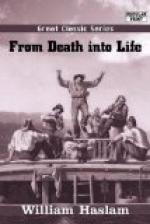The majority of the people were complacently waiting for another tide of revival; this was their custom, but it sat very uneasily upon me. I did not like it, nor agree to it; but at that time I knew not what else to do, but wait as others did. I said that we looked like vessels which had come so far up the river with the tide; and now that it had turned we were stranded and fast in the mud. Sometimes I changed the figure to one not so ignoble, and likened ourselves to the stately vessels anchored in Falmouth harbour, which were there because the wind was contrary. We were wind-bound too, and dependent on circumstances; but my idea of true religion was that we ought not to be like this. I rather took for our type the great steamers which are propelled by powerful engines, and come in and go out, and proceed on their voyage without regard to wind or tide. We ought to be constrained I said, from within by the love of God and thus be enabled to show the power of grace by riding over all obstacles and triumphing in the midst of discouragements. “He giveth songs in the night.” Any bird can sing in the sunshine.
The self-restraint and self-control I had exercised in my churchy days, and which I supposed was derived from sacraments, I found wanting in my new work. We required something with authority, such as church and priest supply. I could not, however, conscientiously go back to that legal system, nor did I think there was any need, for I was sure there was something somewhere, to be had, which should and would supply our want, if I could but discover it. It appeared to me that my people, without this, were subject to impulse, and consequently in bondage to their feelings.
In this time of lull I found that the steadfastness of some was shaken; but I had known others, who had gone further back than these, return at a revival time with new vigour. In this way, some of the Cornish people professed to be converted scores of times. While ruminating on these things and praying over them, I was surprised by receiving a letter pressing me very much to come at once and preach in a parish in Staffordshire, near Birmingham. Mr. Aitken had been on a mission in the north, and on his return had stopped a night at this place, and preached one of his alarming and awakening sermons. The effect was so great that the people, together with their clergyman (a curate in sole charge) were in much trouble and anxiety about their souls; there was a gloom hanging over them, as if they had been sentenced to some dreadful doom, and did not know what to do, or how to avert it.
It is a good thing to wound, but it should be with the object of making whole; it is a blessed thing to show sinners their lost condition, but only for the purpose of getting them to lay hold of the great salvation which is provided for such.




